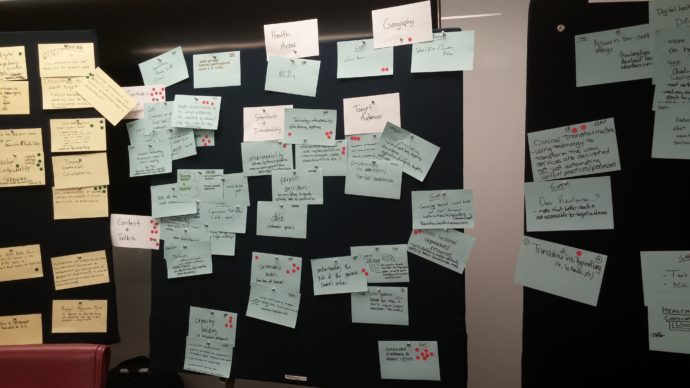Convening to Strengthen the Digital Health Knowledge Base
By Hallie Goertz, Global Training and Packaging Lead, BID Initiative
Aug 18, 2016
Posted in Packaging

Photo: Nexight Group. Prioritization of gaps and overlaps in the digital health knowledge base brainstormed by participants.
Last month, the BID Initiative co-organized a one day meeting in Washington, DC, attended by over 20 participants, to discuss collaboration and alignment of digital health approaches and investments to build a stronger, more accessible, and more usable knowledge base. Our co-organizers were the World Health Organization (WHO) Technical and Evidence Review Group on mHealth (mTERG) within the WHO Reproductive Health and Research Department and mPowering Frontline Health Workers and its ORB platform.
The BID Initiative is working to contribute to the larger knowledge base by creating “packages” of products, policies, and practices that programs and countries can use as a how-to guide for building effective immunization data initiatives, which can also be applied to other health areas. Our goal is for users to be able to easily assemble actionable information and resources that are relevant to them and their challenges through a guided selection process. But, we aren’t the only ones. For example, NetHope developed the SDG ICT Playbook which includes recommendations for where to make investment in information communications technologies (ICTs) to support achievements of Sustainable Development Goals.
Increasingly, global development stakeholders – particularly in the digital space — are looking for better ways to structure and share findings, solutions, and best practices for reuse, adaptation, and, yes, to attain scale. The Principles for Digital Development encourage us to: reuse and improve, collaborate, use open source, and design for scale while building for sustainability. But, how can we most effectively carry out these fundamental standards?
This meeting brought together voices and perspectives from a variety of implementing organizations and donors, including USAID, K4Health, DIAL, and others, to discuss how we can collaborate and align our approaches and investments, increasing resource sharing and improving alignment.
Participating organizations acknowledged that they sometimes, and often unknowingly, are developing similar, or overlapping training resources, data collection tools, guidance, and other resources. And, that these are shared on different platforms, despite similar areas of focus and target audiences.
Participants also discussed gaps in the knowledge base; collaborative activities and linkages that would accelerate our progress; and, how to stimulate collective action on the highest priority areas for collaboration.
At the end of the meeting, participants also made individual commitments to further a collaborative and aligned knowledge base.
(I commit to) trail blaz(ing) shared value partnerships in digital health, sharing learnings and fostering further and broader collaborations. –Dykki Settle, Director, Digital Health Solutions, PATH
A report summarizing the meeting is being prepared and will be shared in the BID Learning Network Resource Library. We hope to continue these conversations at a second convening at the Digital Health Forum in December. If you have any questions, or would like to be involved in these conversations, email BID Global Training and Packaging Lead Hallie Goertz (hgoertz@path.org).
More information about our co-organizers can be found below:
The WHO Technical and Evidence Review Group on mHealth (mTERG) is situated within the WHO Reproductive Health and Research Department and is actively engaged in developing WHO Guidance, including evidence based recommendations and a digital health implementation toolkit that focus on informing decision-making within government on the selection and integration of digital tools for health system strengthening. These documents are complemented by the digitalhealthatlas.org online platform for digital investment registration, mapping, and curation.
ORB offers frontline health workers and trainers access to quality assured openly licensed content that can be used on mobile devices and shared virtually amongst communities. By improving access to health content and mobile learning, ORB helps health workers access the vital content they need to do their work effectively and confidently. ORB was developed by the mPowering Frontline Health Workers partnership.
